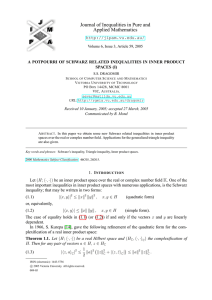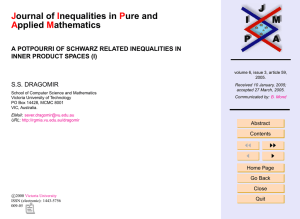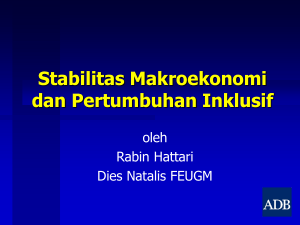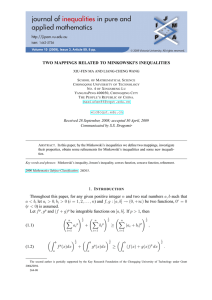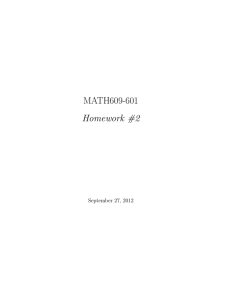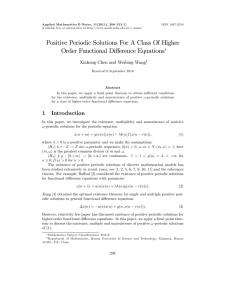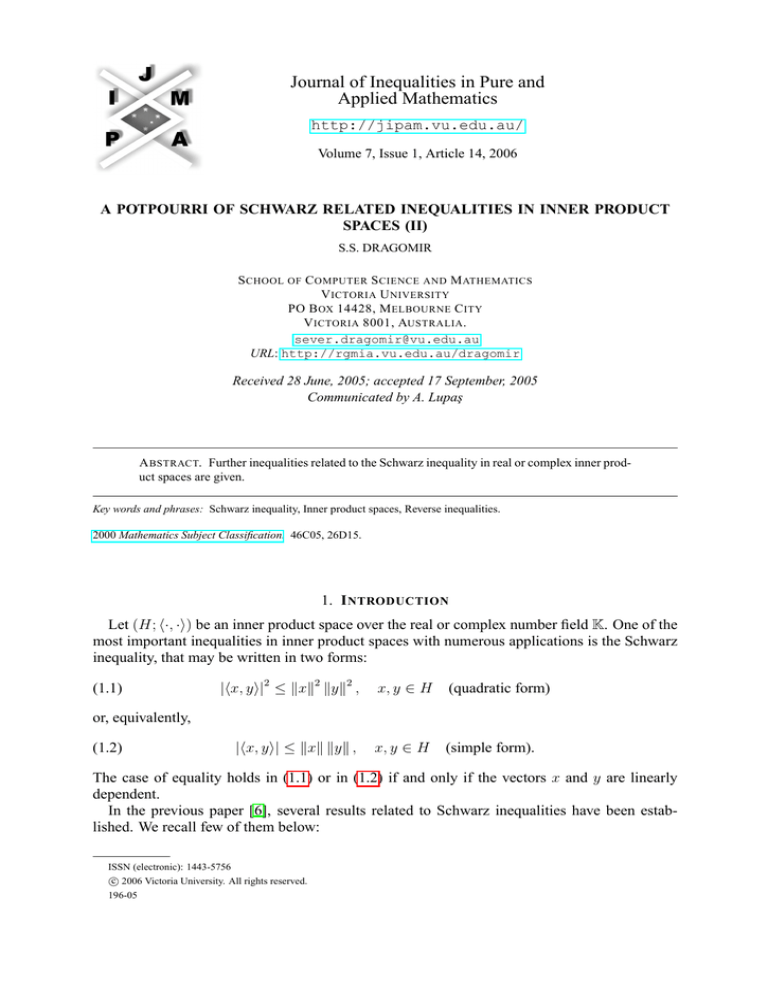
Journal of Inequalities in Pure and
Applied Mathematics
http://jipam.vu.edu.au/
Volume 7, Issue 1, Article 14, 2006
A POTPOURRI OF SCHWARZ RELATED INEQUALITIES IN INNER PRODUCT
SPACES (II)
S.S. DRAGOMIR
S CHOOL OF C OMPUTER S CIENCE AND M ATHEMATICS
V ICTORIA U NIVERSITY
PO B OX 14428, M ELBOURNE C ITY
V ICTORIA 8001, AUSTRALIA .
sever.dragomir@vu.edu.au
URL: http://rgmia.vu.edu.au/dragomir
Received 28 June, 2005; accepted 17 September, 2005
Communicated by A. Lupaş
A BSTRACT. Further inequalities related to the Schwarz inequality in real or complex inner product spaces are given.
Key words and phrases: Schwarz inequality, Inner product spaces, Reverse inequalities.
2000 Mathematics Subject Classification. 46C05, 26D15.
1. I NTRODUCTION
Let (H; h·, ·i) be an inner product space over the real or complex number field K. One of the
most important inequalities in inner product spaces with numerous applications is the Schwarz
inequality, that may be written in two forms:
(1.1)
|hx, yi|2 ≤ kxk2 kyk2 ,
x, y ∈ H
(quadratic form)
|hx, yi| ≤ kxk kyk ,
x, y ∈ H
(simple form).
or, equivalently,
(1.2)
The case of equality holds in (1.1) or in (1.2) if and only if the vectors x and y are linearly
dependent.
In the previous paper [6], several results related to Schwarz inequalities have been established. We recall few of them below:
ISSN (electronic): 1443-5756
c 2006 Victoria University. All rights reserved.
196-05
2
S.S. D RAGOMIR
1. If x, y ∈ H\ {0} and kxk ≥ kyk , then
r−1
1 2 kxk
kx − yk2 if r ≥ 1
2 r kyk
(1.3)
kxk kyk − Re hx, yi ≤
1 kxk 1−r kx − yk2
if r < 1.
2 kyk
2. If (H; h·, ·i) is complex, α ∈ C with Re α, Im α > 0 and x, y ∈ H are such that
Im
α
x −
≤r
(1.4)
·
y
Re α then
kxk kyk − Re hx, yi ≤
(1.5)
1 Re α 2
·
r .
2 Im α
3. If α ∈ K\ {0} , then for any x, y ∈ H
2
1 [|Re α| kx − yk + |Im α| kx + yk]2
α
(1.6)
kxk kyk − Re
hx,
yi
≤
·
.
2
|α|2
|α|2
4. If p ≥ 1, then for any x, y ∈ H one has
1
(kxk + kyk)2p − kx + yk2p p ,
1
(1.7)
kxk kyk − Re hx, yi ≤ ×
2
1
kx − yk2p − |kxk − kyk|2p p .
5. If α, γ > 0 and β ∈ K with |β|2 ≥ αγ then for x, a ∈ H with a 6= 0 and
12
2
|β|
−
αγ
β
x − a ≤
(1.8)
kak ,
α α
one has
Re β Re hx, ai + Im β Im hx, ai
√
αγ
|β| |hx, ai|
≤ √
αγ
kxk kak ≤
(1.9)
and
|β|2 − αγ
(1.10)
kxk kak − |hx, ai| ≤
|hx, ai|2 .
αγ
The aim of this paper is to provide other results related to the Schwarz inequality. Applications for reversing the generalised triangle inequality are also given.
2
2
2
2. Q UADRATIC S CHWARZ R ELATED I NEQUALITIES
The following result holds.
Theorem 2.1. Let (H; h·, ·i) be a complex inner product space and x, y ∈ H, α ∈ [0, 1] . Then
(2.1)
α kty − xk2 + (1 − α) kity − xk2 kyk2
≥ kxk2 kyk2 − [(1 − α) Im hx, yi + α Re hx, yi]2 ≥ 0
for any t ∈ R.
J. Inequal. Pure and Appl. Math., 7(1) Art. 14, 2006
http://jipam.vu.edu.au/
S CHWARZ R ELATED I NEQUALITIES IN I NNER P RODUCT S PACES
3
Proof. Firstly, recall that for a quadratic polynomial P : R → R, P (t) = at2 + 2bt + c, a > 0,
we have that
b
ac − b2
(2.2)
inf P (t) = P −
=
.
t∈R
a
a
Now, consider the polynomial P : R → R given by
P (t) := α kty − xk2 + (1 − α) kity − xk2 .
(2.3)
Since
kty − xk2 = t2 kyk2 − 2t Re hx, yi + kxk2
and
kity − xk2 = t2 kyk2 − 2t Im hx, yi + kxk2 ,
hence
P (t) = t2 kyk2 − 2t [α Re hx, yi + (1 − α) Im hx, yi] + kxk2 .
By the definition of P (see (2.3)), we observe that P (t) ≥ 0 for every t ∈ R, therefore 41 ∆ ≤ 0,
i.e.,
[(1 − α) Im hx, yi + α Re hx, yi]2 − kxk2 kyk2 ≤ 0,
proving the second inequality in (2.1).
The first inequality follows by (2.2) and the theorem is proved.
The following particular cases are of interest.
Corollary 2.2. For any x, y ∈ H one has the inequalities:
(2.4)
kty − xk2 kyk2 ≥ kαk2 kyk2 − [Re hx, yi]2 ≥ 0;
(2.5)
kity − xk2 kyk2 ≥ kαk2 kyk2 − [Im hx, yi]2 ≥ 0;
and
1
(2.6)
kty − xk2 + kity − xk2 kyk2 ≥ kxk2 kyk2 −
2
for any t ∈ R.
Im hx, yi + Re hx, yi
2
2
≥ 0,
The following corollary may be stated as well:
Corollary 2.3. Let x, y ∈ H and Mi , mi ∈ R, i ∈ {1, 2} such that Mi ≥ mi > 0, i ∈ {1, 2} .
If either
(2.7)
Re hM1 y − x, x − m1 yi ≥ 0 and
Re hM2 iy − x, x − im2 yi ≥ 0,
or, equivalently,
(2.8)
x − M1 + m1 y ≤
2
M
+
m
2
2
x −
iy ≤
2
1
(M1 − m1 ) kyk
2
1
(M2 − m2 ) kyk
2
and
hold, then
(2.9)
(0 ≤) kxk2 kyk2 − [(1 − α) Im hx, yi + α Re hx, yi]2
1
≤ kyk4 α (M1 − m1 )2 + (1 − α) (M2 − m2 )2
4
for any α ∈ [0, 1] .
Proof. It is easy to see that, if x, z, Z ∈ H, then the following statements are equivalent:
J. Inequal. Pure and Appl. Math., 7(1) Art. 14, 2006
http://jipam.vu.edu.au/
4
S.S. D RAGOMIR
(i) Re
− x,
hZ z+Z
x −1 zi ≥ 0,
(ii) x − 2 ≤ 2 kZ − zk .
Utilising this property one may simply realize that the statements (2.7) and (2.8) are equivalent.
Now, on making use of (2.8) and (2.1), one may deduce the desired inequality (2.9).
Remark 2.4. If one assumes that M1 = M2 = M, m1 = m2 = m in either (2.7) or (2.8), then
(0 ≤) kxk2 kyk2 − [(1 − α) Im hx, yi + α Re hx, yi]2
1
≤ kyk4 (M − m)2
4
(2.10)
for each α ∈ [0, 1] .
Remark 2.5. Corollary 2.3 may be seen as a potential source of some reverse results for the
Schwarz inequality. For instance, if x, y ∈ H and M ≥ m > 0 are such that either
1
M
+
m
≤ (M − m) kyk
y
(2.11)
Re hM y − x, x − myi ≥ 0 or x
−
2
2
hold, then
(0 ≤) kxk2 kyk2 − [Re hx, yi]2 ≤
(2.12)
1
(M − m)2 kyk4 .
4
If x, y ∈ H and N ≥ n > 0 are such that either
N +n 1
(2.13)
Re hN iy − x, x − niyi ≥ 0 or x −
iy ≤ (N − n) kyk
2
2
hold, then
1
(2.14)
(0 ≤) kxk2 kyk2 − [Im hx, yi]2 ≤ (N − n)2 kyk4 .
4
We notice that (2.12) is an improvement of the inequality
1
(0 ≤) kxk2 kyk2 − |hx, yi|2 ≤ (M − m)2 kyk4
4
that has been established in [4] under the same condition (2.11) given above.
The following result may be stated as well.
Theorem 2.6. Let (H; h·, ·i) be a real or complex inner product space and x, y ∈ H, α ∈ [0, 1] .
Then
(2.15) α kty − xk2 + (1 − α) ky − txk2 α kyk2 + (1 − α) kxk2
≥ (1 − α) kxk2 + α kyk2 α kxk2 + (1 − α) kyk2 − [Re hx, yi]2 ≥ 0
for any t ∈ R.
Proof. Consider the polynomial P : R → R given by
(2.16)
P (t) := α kty − xk2 + (1 − α) ky − txk2 .
Since
kty − xk2 = t2 kyk2 − 2t Re hx, yi + kxk2
and
ky − txk2 = t2 kxk2 − 2t Re hx, yi + kyk2 ,
hence
P (t) = α kyk2 + (1 − α) kxk2 t2 − 2t Re hx, yi + α kxk2 + (1 − α) kyk2
J. Inequal. Pure and Appl. Math., 7(1) Art. 14, 2006
http://jipam.vu.edu.au/
S CHWARZ R ELATED I NEQUALITIES IN I NNER P RODUCT S PACES
5
for any t ∈ R.
By the definition of P (see (2.16)), we observe that P (t) ≥ 0 for every t ∈ R, therefore
1
∆
≤ 0, i.e., the second inequality in (2.15) holds true.
4
The first inequality follows by (2.2) and the theorem is proved.
Remark 2.7. We observe that if either α = 0 or α = 1, then (2.15) will generate the same
reverse of the Schwarz inequality as (2.4) does.
Corollary 2.8. If x, y ∈ H, then
(2.17)
kty − xk2 + ky − txk2 kxk2 + kyk2
·
≥
2
2
kxk2 + kyk2
2
!2
− [Re hx, yi]2 ≥ 0
for any t ∈ R and
(2.18)
kx ± yk2 α kyk2 + (1 − α) kxk2
≥ (1 − α) kxk2 + α kyk2 α kxk2 + (1 − α) kyk2 − [Re hx, yi]2 ≥ 0
for any α ∈ [0, 1] .
In particular, we have
2
(2.19)
kx ± yk2 ·
2
kxk + kyk
2
!
2
≥
2
kxk + kyk
2
!2
− [Re hx, yi]2 ≥ 0.
In [7, p. 210], C.S. Lin has proved the following reverse of the Schwarz inequality in real or
complex inner product spaces (H; h·, ·i) :
1
(0 ≤) kxk2 kyk2 − |hx, yi|2 ≤ 2 kxk2 kx − ryk2
r
for any r ∈ R, r 6= 0 and x, y ∈ H.
The following slightly more general result may be stated:
Theorem 2.9. Let (H; h·, ·i) be a real or complex inner product space. Then for any x, y ∈ H
and α ∈ K (C, R) with α 6= 0 we have
1
(2.20)
(0 ≤) kxk2 kyk2 − |hx, yi|2 ≤
kxk2 kx − αyk2 .
|α|2
The case of equality holds in (2.20) if and only if
Re hx, αyi = kxk2 .
(2.21)
Proof. Observe that
I (α) := kxk2 kx − αyk2 − |α|2 kxk2 kyk2 − |hx, yi|2
= kxk2 kxk2 − 2 Re [ᾱ hx, yi] + |α|2 kyk2
− |α|2 kxk2 kyk2 + |α|2 |hx, yi|2
= kxk4 − 2 kxk2 Re [ᾱ hx, yi] + |α|2 |hx, yi|2 .
Since
(2.22)
Re [ᾱ hx, yi] ≤ |α| |hx, yi| ,
hence
(2.23)
I (α) ≥ kxk4 − 2 kxk2 |α| |hx, yi| + |α|2 |hx, yi|2
2
= kxk2 − |α| |hx, yi| ≥ 0.
J. Inequal. Pure and Appl. Math., 7(1) Art. 14, 2006
http://jipam.vu.edu.au/
6
S.S. D RAGOMIR
Conversely, if (2.21) holds true, then I (α) = 0, showing that the equality case holds in (2.20).
Now, if the equality case holds in (2.20), then we must have equality in (2.22) and in (2.23)
implying that
Re [hx, αyi] = |α| |hx, yi| and |α| |hx, yi| = kxk2
which imply (2.21).
The following result may be stated.
Corollary 2.10. Let (H; h·, ·i) be as above and x, y ∈ H, α ∈ K\ {0} and r > 0 such that
|α| ≥ r. If
kx − αyk ≤ r kyk ,
(2.24)
then
q
|α|2 − r2
(2.25)
|α|
≤
|hx, yi|
(≤ 1) .
kxk kyk
Proof. From (2.24) and (2.20) we have
kxk2 kyk2 − |hx, yi|2 ≤
r2
2
2
2 kxk kyk ,
|α|
that is,
|α|2 − r2
2
|α|
which is clearly equivalent to (2.25).
kxk2 kyk2 ≤ |hx, yi|2 ,
Remark 2.11. Since for Γ, γ ∈ K the following statements are equivalent
(i) Re
≥ 0,
hΓy − x, x − γyi
≤ 1 |Γ − γ| kyk ,
(ii) x − γ+Γ
·
y
2
2
hence by Corollary 2.10 we deduce
1
2 [Re (Γγ̄)] 2
|hx, yi|
≤
,
|Γ + γ|
kxk kyk
(2.26)
provided Re (Γγ̄) > 0, an inequality that has been obtained in a different way in [3].
Corollary 2.12. If x, y ∈ H, α ∈ K\ {0} and ρ > 0 such that kx − αyk ≤ ρ, then
(2.27)
(0 ≤) kxk2 kyk2 − |hx, yi|2 ≤
ρ2
2
2 kxk .
|α|
3. OTHER I NEQUALITIES
The following result holds.
Proposition 3.1. Let x, y ∈ H \ {0} and ε ∈ (0, 12 ]. If
(3.1)
(0 ≤) 1 − ε −
√
1 − 2ε ≤
√
kxk
≤ 1 − ε + 1 − 2ε,
kyk
then
(3.2)
(0 ≤) kxk kyk − Re hx, yi ≤ ε kx − yk2 .
J. Inequal. Pure and Appl. Math., 7(1) Art. 14, 2006
http://jipam.vu.edu.au/
S CHWARZ R ELATED I NEQUALITIES IN I NNER P RODUCT S PACES
7
Proof. If x = y, then (3.2) is trivial.
Suppose x 6= y. Utilising the inequality (2.5) from [6], we can state that
kxk kyk − Re hx, yi
2 kxk kyk
≤
2
kx − yk
(kxk + kyk)2
for any x, y ∈ H \ {0} , x 6= y.
Now, if we assume that
2 kxk kyk
≤ ε,
(kxk + kyk)2
then, after some manipulation, we get that
ε kxk2 + 2 (ε − 1) kxk kyk + ε kyk2 ≥ 0,
which, for ε ∈ (0, 12 ] and y 6= 0, is clearly equivalent to (3.1).
The proof is complete.
The following result may be stated:
Proposition 3.2. Let (H; h·, ·i) be a real or complex inner product space. Then for any x, y ∈ H
and ϕ ∈ R one has:
kxk kyk − [cos 2ϕ · Re hx, yi + sin 2ϕ · Im hx, yi]
1
≤ [|cos ϕ| kx − yk + |sin ϕ| kx + yk]2 .
2
Proof. For ϕ ∈ R, consider the complex number α = cos ϕ − i sin ϕ. Then α2 = cos 2ϕ −
i sin 2ϕ, |α| = 1 and by the inequality (1.6) we deduce the desired result.
From a different perspective, we may consider the following results as well:
Theorem 3.3. Let (H; h·, ·i) be a real or complex inner product space, α ∈ K with |α − 1| = 1.
Then for any e ∈ H with kek = 1 and x, y ∈ H, we have
(3.3)
|hx, yi − α hx, ei he, yi| ≤ kxk kyk .
The equality holds in (3.3) if and only if there exists a λ ∈ K such that
α hx, ei e = x + λy.
(3.4)
Proof. It is known that for u, v ∈ H, we have equality in the Schwarz inequality
|hu, vi| ≤ kuk kvk
(3.5)
if and only if there exists a λ ∈ K such that u = λv.
If we apply (3.5) for u = α hx, ei e − x, v = y, we get
(3.6)
|hα hx, ei e − x, yi| ≤ kα hx, ei e − xk kyk
with equality iff there exists a λ ∈ K such that
α hx, ei e = x + λy.
Since
kα hx, ei e − xk2 = |α|2 |hx, ei|2 − 2 Re [α] |hx, ei|2 + kxk2
= |α|2 − 2 Re [α] |hx, ei|2 + kxk2
= |α − 1|2 − 1 |hx, ei|2 + kxk2
= kxk2
J. Inequal. Pure and Appl. Math., 7(1) Art. 14, 2006
http://jipam.vu.edu.au/
8
S.S. D RAGOMIR
and
hα hx, ei e − x, yi = α hx, ei he, yi − hx, yi
hence by (3.6) we deduce the desired inequality (3.3).
Remark 3.4. If α = 0 in (3.3), then it reduces to the Schwarz inequality.
Remark 3.5. If α 6= 0, then (3.3) is equivalent to
1
hx, ei he, yi − hx, yi ≤ 1 kxk kyk .
(3.7)
|α|
α
Utilising the continuity property of modulus for complex numbers, i.e., |z − w| ≥ ||z| − |w||
we then obtain
|hx, ei he, yi| − 1 |hx, yi| ≤ 1 kxk kyk ,
|α|
|α|
which implies that
1
[|hx, yi| + kxk kyk] .
(3.8)
|hx, ei he, yi| ≤
|α|
z
, z 6= 0, we get from (3.8) that
For e = kzk
(3.9)
|hx, zi hz, yi| ≤
1
[|hx, yi| + kxk kyk] kzk2
|α|
for any α ∈ K\ {0} with |α − 1| = 1 and x, y, z ∈ H.
For α = 2, we get from (3.9) the Buzano inequality [1]
1
(3.10)
|hx, zi hz, yi| ≤ [|hx, yi| + kxk kyk] kzk2
2
for any x, y, z ∈ H.
Remark 3.6. In the case of real spaces the condition |α − 1| = 1 is equivalent to either α = 0
or α = 2. For α = 2 we deduce from (3.7) that
1
1
(3.11)
[hx, yi − kxk kyk] ≤ hx, ei he, yi ≤ [hx, yi + kxk kyk]
2
2
for any x, y ∈ H and e ∈ H with kek = 1, which implies Richard’s inequality [8]:
1
1
(3.12)
[hx, yi − kxk kyk] kzk2 ≤ hx, zi hz, yi ≤ [hx, yi + kxk kyk] kzk2 ,
2
2
for any x, y, z ∈ H.
The following result concerning a generalisation for orthornormal families of the inequality
(3.3) may be stated.
Theorem 3.7. Let (H; h·, ·i) be a real or complex inner product space, {ei }i∈F a finite orthonormal family, i.e., hei , ej i = δij for i, j ∈ F , where δij is Kronecker’s delta and αi ∈ K,
i ∈ F such that |αi − 1| = 1 for each i ∈ F. Then
X
(3.13)
αi hx, ei i hei , yi ≤ kxk kyk .
hx, yi −
i∈F
The equality holds in (3.13) if and only if there exists a constant λ ∈ K such that
X
(3.14)
αi hx, ei i ei = x + λy.
i∈F
J. Inequal. Pure and Appl. Math., 7(1) Art. 14, 2006
http://jipam.vu.edu.au/
S CHWARZ R ELATED I NEQUALITIES IN I NNER P RODUCT S PACES
9
Proof. As above, by Schwarz’s inequality, we have
*
+ X
X
(3.15)
αi hx, ei i ei − x, y ≤ αi hx, ei i ei − x kyk
i∈F
i∈F
P
with equality if and only if there exists a λ ∈ K such that i∈F αi hx, ei i ei = x + λy.
Since
2
2
*
+ X
X
X
αi hx, ei i ei − x = kxk2 − 2 Re x,
αi hx, ei i ei + αi hx, ei i ei i∈F
i∈F
i∈F
X
X
αi hx, ei i hx, ei i +
|αi |2 |hx, ei i|2
= kxk2 − 2
i∈F
i∈F
2
X
2
X
= kxk +
2
|hx, ei i|
2
|αi | − 2 Re αi
i∈F
= kxk +
|hx, ei i|2 |αi − 1|2 − 1
i∈F
2
= kxk ,
hence the inequality (3.13) is obtained.
Remark 3.8. If the space is real, then the nontrivial case one can get from (3.13) is for all
αi = 2, obtaining the inequality
X
1
1
(3.16)
[hx, yi − kxk kyk] ≤
hx, ei i hei , yi ≤ [hx, yi + kxk kyk]
2
2
i∈F
that has been obtained in [5].
Corollary 3.9. With the above assumptions, we have
X
X
(3.17)
αi hx, ei i hei , yi ≤ |hx, yi| + hx, yi −
αi hx, ei i hei , yi
i∈F
i∈F
≤ |hx, yi| + kxk kyk ,
x, y ∈ H,
where |αi − 1| = 1 for each i ∈ F and {ei }i∈F is an orthonormal family in H.
4. A PPLICATIONS FOR THE T RIANGLE I NEQUALITY
In 1966, Diaz and Metcalf [2] proved the following reverse of the triangle inequality:
n
n
X X
(4.1)
x
≥
r
kxi k ,
i
i=1
i=1
provided the vectors xi in the inner product space (H; h·, ·i) over the real or complex number
field K are nonzero and
Re hxi , ai
(4.2)
0≤r≤
for each i ∈ {1, . . . , n} ,
kxi k
where a ∈ H, kak = 1. The equality holds in (4.2) if and only if
!
n
n
X
X
(4.3)
xi = r
kxi k a.
i=1
i=1
The following result may be stated:
J. Inequal. Pure and Appl. Math., 7(1) Art. 14, 2006
http://jipam.vu.edu.au/
10
S.S. D RAGOMIR
Proposition 4.1. Let e ∈ H with kek = 1, ε ∈ 0, 12 and xi ∈ H, i ∈ {1, . . . , n} with the
property that
√
√
(4.4)
(0 ≤) 1 − ε − 1 − 2ε ≤ kxi k ≤ 1 − ε + 1 − 2ε
for each i ∈ {1, . . . , n} . Then
n
X
(4.5)
i=1
n
n
X
X
kxi k ≤ xi + ε
kxi − ek2 .
i=1
i=1
Proof. Utilising Proposition 3.1 for x = xi and y = e, we can state that
kxi k − Re hxi , ei ≤ ε kxi − ek2
for each i ∈ {1, . . . , n} . Summing over i from 1 to n, we deduce that
* n
+
n
n
X
X
X
(4.6)
kxi k ≤ Re
xi , e + ε
kxi − ek2 .
i=1
i=1
i=1
By Schwarz’s inequality in (H; h·, ·i) , we also have
* n
+ * n
+ * n
+
X
X
X
Re
xi , e ≤ Re
xi , e ≤ (4.7)
xi , e i=1
i=1
n i=1
n
X X xi .
≤
xi kek = i=1
i=1
Therefore, by (4.6) and (4.7) we deduce (4.5).
In the same spirit, we can prove the following result as well:
Proposition 4.2. Let (H; h·, ·i) be a real or complex inner product space and e ∈ H with
kek = 1. Then for any ϕ ∈ R one has the inequality:
n
n
n
X
1X
X
[|cos ϕ| kxi − ek + |sin ϕ| kxi + ek]2 .
(4.8)
kxi k ≤ xi +
2
i=1
i=1
i=1
Proof. Applying Proposition 3.2 for x = xi and y = e, we have:
kxi k ≤ cos 2ϕ · Re hxi , ei + sin 2ϕ · Im hxi , ei
1
+ [|cos ϕ| kxi − ek + |sin ϕ| kxi + ek]2
2
for any i ∈ {1, . . . , n} .
Summing in (4.5) over i from 1 to n, we have:
* n
+
* n
+
n
X
X
X
(4.10)
kxi k ≤ cos 2ϕ · Re
xi , e + sin 2ϕ · Im
xi , e
(4.9)
i=1
i=1
i=1
+
1
2
n
X
[|cos ϕ| kxi − ek + |sin ϕ| kxi + ek]2 .
i=1
Now, by the elementary inequality for the real numbers m, p, M and P,
1
1
mM + pP ≤ m2 + p2 2 M 2 + P 2 2 ,
J. Inequal. Pure and Appl. Math., 7(1) Art. 14, 2006
http://jipam.vu.edu.au/
S CHWARZ R ELATED I NEQUALITIES IN I NNER P RODUCT S PACES
11
we have
(4.11) cos 2ϕ · Re
* n
X
+
xi , e
+ sin 2ϕ · Im
* n
X
i=1
+
xi , e
i=1
≤ cos2 2ϕ + sin2 2ϕ
21
"
Re
* n
X
+#2
xi , e
"
+ Im
i=1
* n
X
+#2 12
xi , e
i=1
*
+ n
n
n
X
X X
=
xi , e ≤ xi kek = xi ,
i=1
i=1
i=1
where for the last inequality we used Schwarz’s inequality in (H; h·, ·i) .
Finally, by (4.10) and (4.11) we deduce the desired result (4.8).
R EFERENCES
[1] M.L. BUZANO, Generalizzazione della disiguaglianza di Cauchy-Schwarz (Italian), Rend. Sem.
Mat. Univ. e Politech. Torino, 31 (1971/73), 405-409 (1974).
[2] J.B. DIAZ AND F.T. METCALF, A complementary inequality in Hilbert and Banach spaces, Proc.
Amer. Math. Soc., 17(1) (1966), 88-97.
[3] S.S. DRAGOMIR, Reverses of Schwarz, triangle and Bessel inequalities in inner product spaces,
J. Inequal. Pure & Appl. Math., 5(3) (2004), Art. 76. [ONLINE http://jipam.vu.edu.au/
article.php?sid=432].
[4] S.S. DRAGOMIR, A counterpart of Schwarz’s inequality in inner product spaces, East Asian Math.
J., 20(1) (2004), 1-10.
[5] S.S. DRAGOMIR, Inequalities for orthornormal families of vectors in inner product spaces related
to Buzano’s, Richard’s and Kurepa’s results, RGMIA Res. Rep. Coll., 7(2004), Article 25. [ONLINE
http://rgmia.vu.edu.au/v7(E).html].
[6] S.S. DRAGOMIR, A potpourri of Schwarz related inequalities in inner product spaces (I), J. Inequal.
Pure & Appl. Math., 6(3) (2004), Art. 59. [ONLINE http://jipam.vu.edu.au/article.
php?sid=532].
[7] C.S. LIN, Cauchy-Schwarz inequality and generalized Bernstein-type inequalities, in Inequality Theory and Applications, Vol. 1, Eds. Y.J. Cho, J.K. Kim and S.S. Dragomir, Nova Science Publishers
Inc., N.Y., 2001.
[8] U. RICHARD, Sur des inégalités du type Wirtinger et leurs application aux équationes différentielles
ordinaires, Colloquium of Analysis held in Rio de Janeiro, August, 1972, pp. 233-244.
J. Inequal. Pure and Appl. Math., 7(1) Art. 14, 2006
http://jipam.vu.edu.au/


